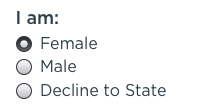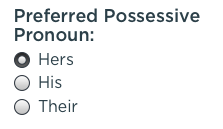Profile and registration forms are everywhere on the Web. If crafted well, these forms not only welcome you to a service or community but they also allow you to decide how you want to be seen.
The information collected in these forms (like your name, location, and gender) can also be used to personalize the information and interactions on a Web site for you. That tends to create more comfortable places you’re more likely to revisit.
"If a user comes on more than once and is willing to give Facebook a very basic piece of information – their gender – that seems to be the strongest predictor of whether they will stay on the site." –source
So small bits of information can make a big difference, which is why it’s worth taking the time to ensure the questions you ask people about themselves are appropriate and honest. To illustrate, let’s look at the gender question mentioned in the example above. In many Web sites, gender is a binary choice.

Occasionally, a third choice is included as well.

While this gives people who don’t want to share their gender a way to opt out, it doesn’t really do much to address exclusion. More fundamentally, however, asking for gender in this way doesn’t make it clear why the information is needed or how it will be used.
So after a nudge from Livia Labate, information architect (and all around awesome person), we decided to rethink the gender question on Bagcheck and make it clear why we were asking it and what we’d be doing with the information. Here’s our current approach:

With this design, we believe we’re being clear about why we are asking for gender and how it will be used. (And yes people on Bagcheck know what a possessive pronoun is!) We also like to think that we’re letting you know we care about your personal preferences. Though this is just one question on one form, it’s reflective of our broader philosophy about Bagcheck being a comfortable place for all.
Update: A few people have asked about why we selected the term "their". From the Wikipedia: "they/(their) is more often considered to be semantically indeterminate either in number, or in gender.